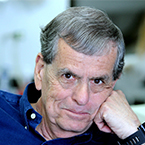
The discovery that the destruction of proteins is as important as their synthesis for the maintenance of protein homeostasis in cells and the unraveling of the ubiquitin system that targets proteins for degradation led to the 2004 Nobel Prize in Chemistry for Dr. Ciechanover. His recent focus has been the involvement of the ubiquitin-protease system (UPS) in the pathogenesis of malignant transformation, especially via activation of NF-κB, the anti-apoptotic factor that is activated by the UPS, and evasion of apoptosis by malignant cells as they gradually develop resistance to genotoxic agents. Identifying irregularities in the UPS has proved critically important in cancer as well as neurodegenerative and immunologic diseases and has resulted already in the development of successful drugs to combat multiple myeloma.
Dr. Ciechanover’s ground-breaking work has opened up opportunities in drug discovery, diagnostics, and treatment. For this work, he has received numerous honors and dozens of honorary degrees in recognition of his contributions to many areas of science.
Career Highlights
2011 Elected Foreign Member, Russian Academy of Sciences
2008 Elected Foreign Fellow (Honorary), American Academy of Arts and Sciences
2008 Elected Foreign Associate, Institute of Medicine
2007 Elected Foreign Associate, National Academy of Sciences, Washington, D.C.
2007 Elected Member, Pontifical Academy of Sciences, the Vatican
2006 Sir Hans Krebs Medal, Federation of the European Biochemical Societies (FEBS)
2005 Elected Foreign Member, American Philosophical Society
2004 Nobel Prize in Chemistry
2004 Elected Member, Israeli Academy of Sciences and Humanities
2003 Israel Prize for Biology
2000 Albert Lasker Award for Basic Medical Research
1996 Elected Member, European Molecular Biology Organization (EMBO)
1981 DSc, Technion-Israel Institute of Technology
1974 MD, Hebrew University Medical School
1970 MSc, Hebrew University Faculty of Natural Sciences